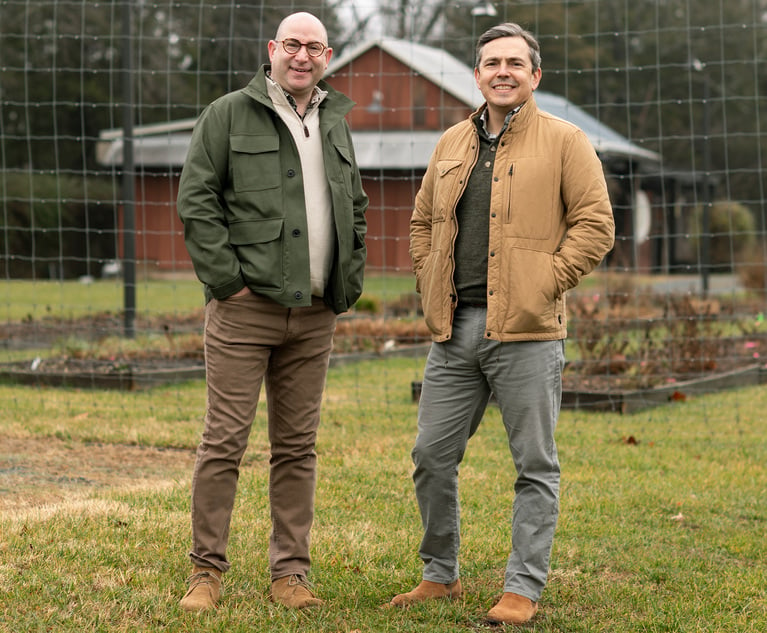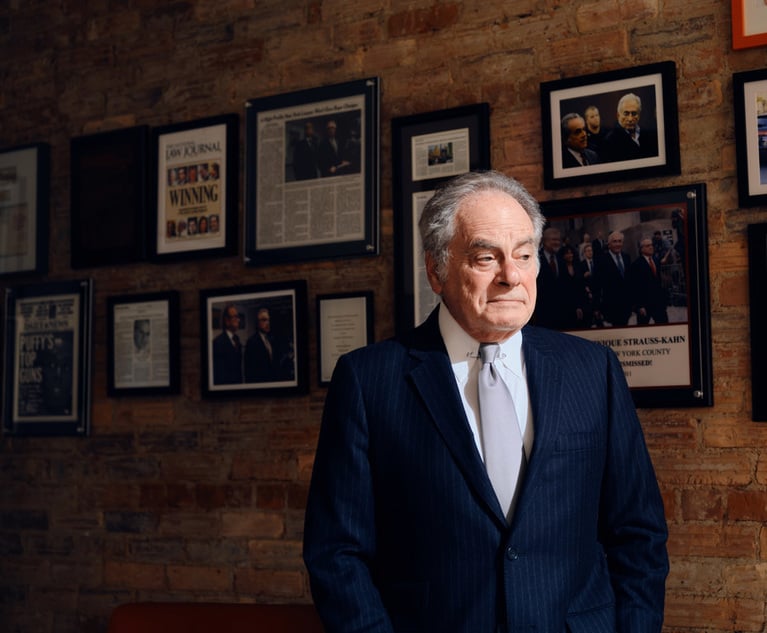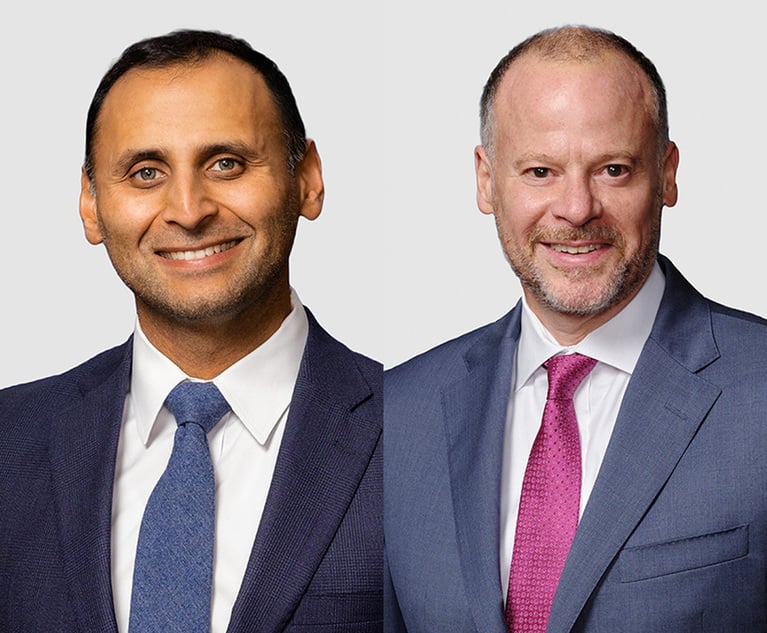Who Says Appeals Are for Partners? Not Hogan Lovells
Hogan and its appellate group headed by Neal Katyal and Cate Stetson have proven extraordinarily generous about sharing the appellate spotlight. The benefits flow both ways.
March 14, 2018 at 12:12 PM
4 minute read

Hogan Lovells senior associate Sean Marotta had just arrived at the U.S. Court of Appeals for the Federal Circuit for his 10 a.m. oral argument on Monday when he had a sinking realization: He left his outline and cheat sheet in the office printer.
But partner Jessica Ellsworth had his back, speed-walking the half-mile back to Hogan's downtown D.C. office to retrieve his notes—a literal example of the firm's appellate partners going out of their way to support their associates.
As for Marotta, he cruised to victory on behalf of Ford Global Technologies in a preclusion and personal jurisdiction case when the court on Tuesday affirmed judgment for his client without issuing an opinion.
The eighth-year associate has amassed a record of appellate arguments that rivals many partners at other firms. On March 9, he was before the D.C. Circuit representing the American Fuel and Petrochemical Manufacturers in a technical dispute with the Surface Transportation Board. Next week, it's the Texas Supreme Court for Ford once again. Marotta will rack up his 20th appellate oral argument when he appears before the New York Appellate Division on March 26 in yet another personal jurisdiction fight for Ford.
To be clear, these are not billion-dollar, bet-the-company cases. But Hogan and its appellate group headed by Neal Katyal and Cate Stetson have proven extraordinarily generous about sharing the appellate spotlight—not just with Marotta, but all 11 of the appellate group associates. The goal is for all of them to get at least one oral argument a year.
Watching them succeed “is the best experience in the world,” Katyal said. But it hasn't happened by chance.
When he left the Office of the Solicitor General in 2011, Katyal said he interviewed with about 30 prospective firms and used the meetings as a chance to learn about their best practices. One firm said it steeply discounted its rates if clients would allow (closely-supervised) associates to handle select oral arguments.
“I asked Hogan in the interview process if they'd be willing to do this, and they said yes,” Katyal said. He's also cultivated relationship with circuit court clerks to get the nod when court-appointed pro bono representation is needed.
The benefits flow both ways—associates get career-advancing appellate argument time, Hogan creates a home-grown bench of experienced appellate advocates and becomes more attractive to top associate recruits.
Yet here's one irony: On paper, Marotta was not obviously one of them. As he points out, he went to law school at William & Mary—a wonderful school, “but it's not Yale. And I clerked for the New Jersey Appellate Division, not the Supreme Court.”
But he dazzled as a summer associate and then during his initial four-month rotation in the appellate group after he joined the firm in 2011.
“I had an elitist hiring bias,” said Katyal, who wasn't at Hogan when Marotta was a summer associate. “The other partners said 'trust us' and they were 100 percent right. It was a good lesson.”
Marotta already seems inclined to pay it forward. Last summer, he put out an open offer to have coffee with any summer associates or law interns in Washington. Fifteen of them took him up on his offer, meeting one-on-one to discuss everything “from, 'What's the future of the Chevron Doctrine in the current court?' to people who were asking for job search tips,” he told The National Law Journal.
One key to the appellate group's success from Katyal on down is rigorous, relentless moot courts.
“The goal is never to get a question in real court that you haven't had in moot,” Marotta said. “The moot questions are harder and we do it much longer.”
As for the advice on handling nerves when it's time for the real thing, Katyal said, “I'm nervous every time I stand up in court. It's not necessarily a bad thing … You're nervous for a reason, because the stakes are high.”
He tells his associates what a mentor once told him: “After 30 seconds, if you've done your work, it will go away.”
This content has been archived. It is available through our partners, LexisNexis® and Bloomberg Law.
To view this content, please continue to their sites.
Not a Lexis Subscriber?
Subscribe Now
Not a Bloomberg Law Subscriber?
Subscribe Now
NOT FOR REPRINT
© 2025 ALM Global, LLC, All Rights Reserved. Request academic re-use from www.copyright.com. All other uses, submit a request to [email protected]. For more information visit Asset & Logo Licensing.
You Might Like
View All
Why the Founders of IP Boutique Fisch Sigler Are Stepping Away From the Law and Starting an AI Venture

Like a Life Raft: Ben Brafman Reflects on Nearly 50 Years as a Defense Attorney

Trying a Case for Abu Ghraib Detainees Two Decades After Abuse

Many Americans Don't Trust the Supreme Court This Election; David Boies Isn't One of Them
Trending Stories
- 1Restoring Trust in the Courts Starts in New York
- 2'Pull Back the Curtain': Ex-NFL Players Seek Discovery in Lawsuit Over League's Disability Plan
- 3Tensions Run High at Final Hearing Before Manhattan Congestion Pricing Takes Effect
- 4Improper Removal to Fed. Court Leads to $100K Bill for Blue Cross Blue Shield
- 5Michael Halpern, Beloved Key West Attorney, Dies at 72
Who Got The Work
Michael G. Bongiorno, Andrew Scott Dulberg and Elizabeth E. Driscoll from Wilmer Cutler Pickering Hale and Dorr have stepped in to represent Symbotic Inc., an A.I.-enabled technology platform that focuses on increasing supply chain efficiency, and other defendants in a pending shareholder derivative lawsuit. The case, filed Oct. 2 in Massachusetts District Court by the Brown Law Firm on behalf of Stephen Austen, accuses certain officers and directors of misleading investors in regard to Symbotic's potential for margin growth by failing to disclose that the company was not equipped to timely deploy its systems or manage expenses through project delays. The case, assigned to U.S. District Judge Nathaniel M. Gorton, is 1:24-cv-12522, Austen v. Cohen et al.
Who Got The Work
Edmund Polubinski and Marie Killmond of Davis Polk & Wardwell have entered appearances for data platform software development company MongoDB and other defendants in a pending shareholder derivative lawsuit. The action, filed Oct. 7 in New York Southern District Court by the Brown Law Firm, accuses the company's directors and/or officers of falsely expressing confidence in the company’s restructuring of its sales incentive plan and downplaying the severity of decreases in its upfront commitments. The case is 1:24-cv-07594, Roy v. Ittycheria et al.
Who Got The Work
Amy O. Bruchs and Kurt F. Ellison of Michael Best & Friedrich have entered appearances for Epic Systems Corp. in a pending employment discrimination lawsuit. The suit was filed Sept. 7 in Wisconsin Western District Court by Levine Eisberner LLC and Siri & Glimstad on behalf of a project manager who claims that he was wrongfully terminated after applying for a religious exemption to the defendant's COVID-19 vaccine mandate. The case, assigned to U.S. Magistrate Judge Anita Marie Boor, is 3:24-cv-00630, Secker, Nathan v. Epic Systems Corporation.
Who Got The Work
David X. Sullivan, Thomas J. Finn and Gregory A. Hall from McCarter & English have entered appearances for Sunrun Installation Services in a pending civil rights lawsuit. The complaint was filed Sept. 4 in Connecticut District Court by attorney Robert M. Berke on behalf of former employee George Edward Steins, who was arrested and charged with employing an unregistered home improvement salesperson. The complaint alleges that had Sunrun informed the Connecticut Department of Consumer Protection that the plaintiff's employment had ended in 2017 and that he no longer held Sunrun's home improvement contractor license, he would not have been hit with charges, which were dismissed in May 2024. The case, assigned to U.S. District Judge Jeffrey A. Meyer, is 3:24-cv-01423, Steins v. Sunrun, Inc. et al.
Who Got The Work
Greenberg Traurig shareholder Joshua L. Raskin has entered an appearance for boohoo.com UK Ltd. in a pending patent infringement lawsuit. The suit, filed Sept. 3 in Texas Eastern District Court by Rozier Hardt McDonough on behalf of Alto Dynamics, asserts five patents related to an online shopping platform. The case, assigned to U.S. District Judge Rodney Gilstrap, is 2:24-cv-00719, Alto Dynamics, LLC v. boohoo.com UK Limited.
Featured Firms
Law Offices of Gary Martin Hays & Associates, P.C.
(470) 294-1674
Law Offices of Mark E. Salomone
(857) 444-6468
Smith & Hassler
(713) 739-1250






